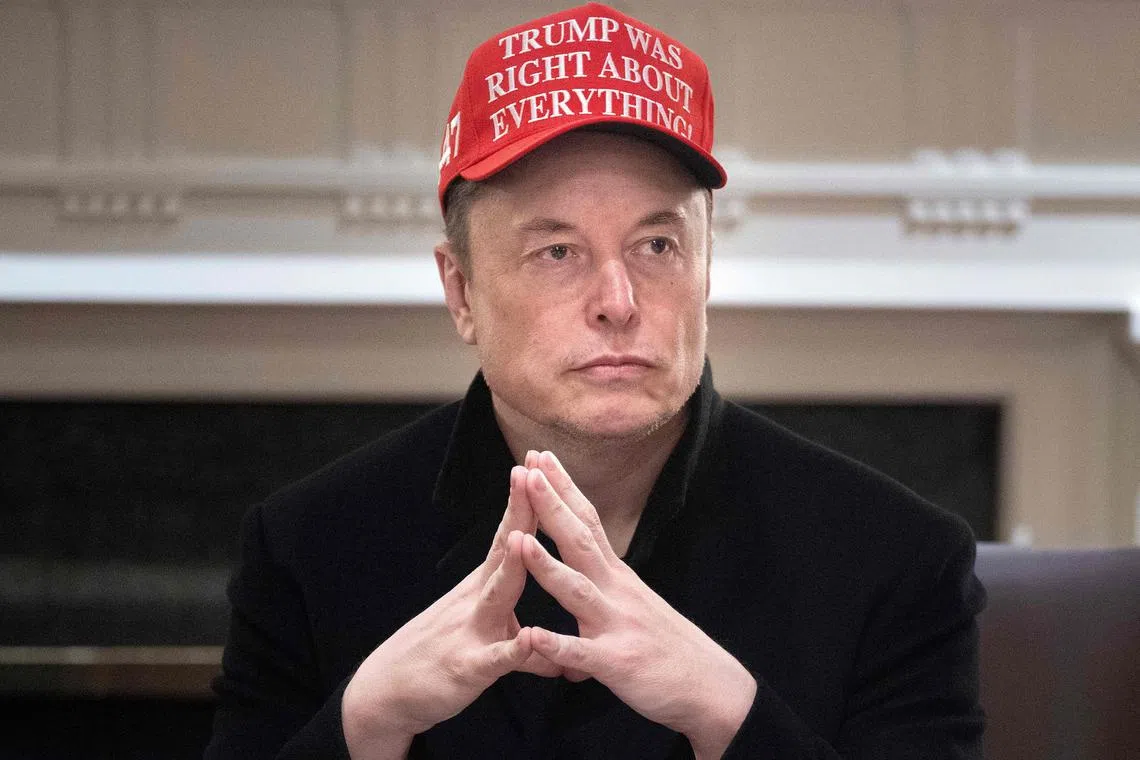Elon Musk leaving Trump administration, capping turbulent tenure
Sign up now: Get ST's newsletters delivered to your inbox

Mr Elon Musk's 130-day mandate as a special government employee in the Trump administration was set to expire around May 30.
PHOTO: AFP
WASHINGTON – Billionaire Tesla chief executive Elon Musk is leaving the Trump administration after a tumultuous period working to restructure the federal government, a White House official confirmed.
A White House official told Reuters it was accurate Mr Musk is leaving the administration and his “off-boarding will begin tonight”.
Mr Musk earlier on May 28 thanked US President Donald Trump as his time as a special government employee as a part of the Department of Government Efficiency (Doge)
His departure was quick and unceremonious. He did not have a formal conversation with Mr Trump before announcing his departure, according to a source with knowledge of the matter, who added that his exit was decided “at a senior staff level”.
While the precise circumstances around his exit were not immediately clear, he leaves a day after criticising the Trump administration’s marquee tax Bill, calling it too expensive and a measure that would undermine his work with Doge.
Some senior White House officials, including Deputy Chief of Staff Stephen Miller, were particularly irked by those comments, and the White House was forced to call Republican senators to reiterate Mr Trump’s support for the package, a source familiar with the matter said.
While Mr Musk remains close to the President, his exit comes after a gradual, but steady slide in standing.
After Mr Trump’s inauguration, the billionaire quickly emerged as a powerful force in Trump’s orbit: hyper-visible, unapologetically brash and unfettered by traditional norms. At the Conservative Political Action Conference in February, he brandished a red metallic chainsaw to wild cheers. “This is the chainsaw for bureaucracy,” he declared.
On the campaign trail, Mr Musk had said Doge would be able to cut at least US$2 trillion (S$2.59 trillion) in federal spending. He did not hide his animus for the federal workforce, and he predicted that revoking “the Covid-era privilege” of telework would trigger “a wave of voluntary terminations that we welcome”.
But some Cabinet members who initially embraced Mr Musk’s outsider energy grew wary of his tactics, sources said. Over time, they grew more confident pushing back against his job cuts, encouraged by Mr Trump’s reminder in early March that staffing decisions rested with department secretaries, not with Mr Musk.
Mr Musk clashed with three of Mr Trump’s most senior Cabinet members – Secretary of State Marco Rubio, Transportation Secretary Sean Duffy and Treasury Secretary Scott Bessent. He called Mr Trump’s trade adviser Peter Navarro a “moron” and “dumber than a sack of bricks”. Mr Navarro dismissed the insults, saying, “I’ve been called worse”.
At the same time, Mr Musk began to hint that his time in government would come to a close, while expressing frustration at times that he could not more aggressively cut spending.
In an April 22 Tesla conference call, he signalled he would be significantly scaling back his government work to focus on his businesses.
Doge goes on
His 130-day mandate as a special government employee in the Trump administration was set to expire around May 30. The administration has said Doge’s efforts to restructure and shrink the federal government will continue.
“The Doge mission will only strengthen over time as it becomes a way of life throughout the government,” Mr Musk said.
Mr Trump and Doge have managed to cut nearly 12 per cent, or 260,000, of the 2.3 million-strong federal civilian workforce largely through threats of firings, buyouts and early retirement offers, a Reuters review of agency departures found.
Mr Musk on May 27 criticised the price tag of Republicans’ tax and budget legislation
“I was disappointed to see the massive spending Bill, frankly, which increases the budget deficit, not just decreases it, and undermines the work that the Doge team is doing,” Mr Musk told CBS News.
His political activities have drawn protests and some investors have called for Mr Musk to leave his work as Mr Trump’s adviser and manage Tesla more closely, after falls in car sales and its stock price.
Mr Musk, the world’s richest person, has defended his role as an unelected official who was granted unprecedented authority by Mr Trump to dismantle parts of the US government.
Having spent nearly US$300 million to back Mr Trump’s presidential campaign and other Republicans in 2024, he said earlier in May he would substantially cut his political spending.
“I think I’ve done enough,” Mr Musk said at an economic forum in Qatar. REUTERS


